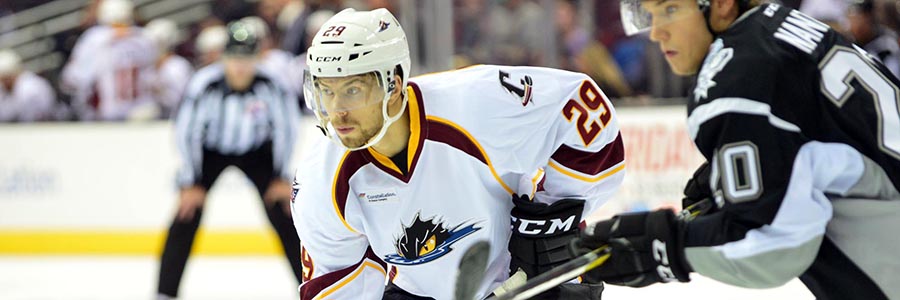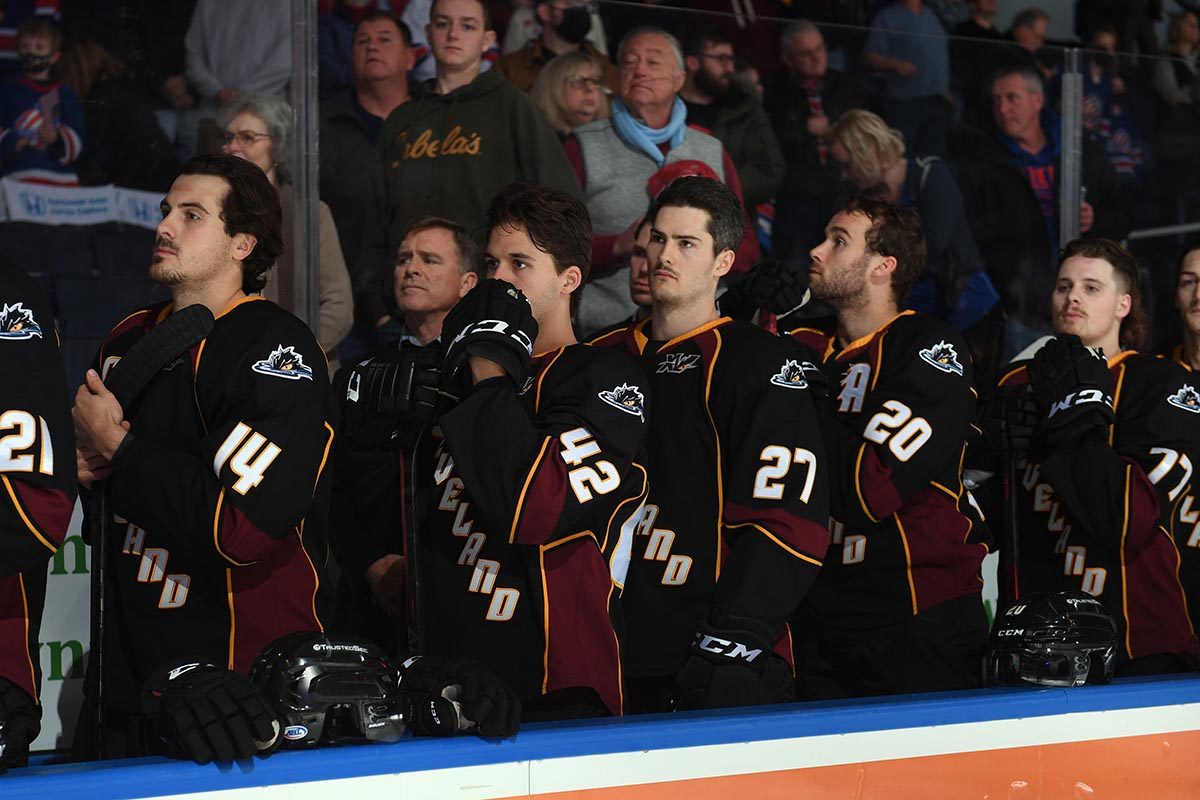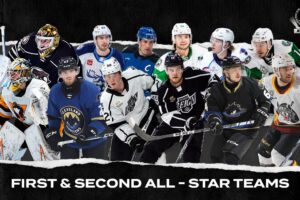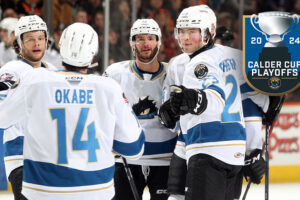📝 by Patrick Williams
A marriage between the Columbus Blue Jackets and Cleveland Monsters, everyone agreed, had long seemed destined to happen.
Success definitely came quickly for the Blue Jackets in their new American Hockey League home, too, with a Calder Cup championship to show for the organizations’ first season together in 2015-16.
But keeping that relationship strong, that is where the work always must continue. Through the highs like the 2016 Calder Cup championship to the inevitable years in which any NHL system has graduated players and must now retool, any strong relationship takes two committed parties, plenty of communication, an understanding of each side’s concerns, and a lot of effort.
Both sides have continued to put in the work, and the Columbus-Cleveland union will continue after the organizations announced a multi-year affiliation extension Dec. 7.
“It’s something that both parties really wanted,” said Chris Clark, the director of player personnel for Columbus and Cleveland’s general manager.
A good affiliation must work from both a development perspective as well as make sense business-wise. And even the best affiliations need maintenance efforts, if for no other reason than external factors. For instance, the AHL will be moving to a uniform 72-game regular-season schedule for the 2022-23 season. With Cleveland playing a 76-game slate this season, that issue needed to be ironed out in the new agreement.
“Nothing that was out of the ordinary,” Clark explained of the negotiating process. “We like the set-up. I think [Cleveland ownership] likes the set-up.”
The Monsters are part of Rock Entertainment Group, a portfolio that also includes the National Basketball Association’s Cleveland Cavaliers and the NBA G League’s Cleveland Charge.
“We both wanted to have the partnership continue,” said Mike Ostrowski, who is president of franchise properties for both the Monsters and the Charge. “As we continued to talk and evaluate, as you always do with these affiliation agreements, [we asked], ‘What makes sense?’ What we like. Maybe things collectively [that] we can work on to be better.
“We just had really great dialogue and discussion.”
From a hockey perspective, the affiliation has produced a 185-164-32-18 regular-season mark in Cleveland along with the 2016 championship, which was led by current Florida Panthers GM Bill Zito and current Colorado Avalanche head coach Jared Bednar. The Monsters have graduated several players on to jobs as NHL regulars in Columbus and elsewhere, including Josh Anderson, Oliver Bjorkstrand, Joonas Korpisalo, Dean Kukan, Sonny Milano, and Zach Werenski.
Columbus has also invested heavily in quality veteran leadership with the likes of Ryan Craig, Nathan Gerbe, and Justin Scott. Columbus assistant coach Steve McCarthy both played and coached in Cleveland while former Monsters players Mark Letestu, Brad Thiessen, and Trent Vogelhuber all have taken coaching roles in Cleveland. Long-time head coach Mike Eaves was brought in to run the bench in 2019.
The set-up’s obvious appeal is location, a factor that Clark believes has intensified player development for Columbus prospects. In a bit more than two hours on Interstate 71, a player can shuttle between Rocket Mortgage FieldHouse in Cleveland’s Gateway District to Nationwide Arena in downtown Columbus. So can Columbus management personnel like Clark.
“I think it’s important for the organization to see the players in person,” Clark said. “And also for the players to see the GM come in and visit.
“John Davidson (the Blue Jackets’ president of hockey operations) will come to games. Jarmo (Kekalainen, Blue Jackets GM), Rick Nash (director of player development). On an off night when Columbus isn’t playing, everybody’s in town, all the guys go up and take the two-hour ride up 71 and watch the game.”

When Clark began his playing career in 1998-99 with the Saint John Flames, geography prevented those types of frequent trips by Calgary Flames management. More than 20 years later, most National Hockey League clubs have made geographic proximity a top consideration for an AHL affiliate.
“I think times have changed,” Clark stated. “Players want to know where they stand. They want more immediate feedback. That’s why we have all the [development] coaches.”
That Blue Jackets presence has also strengthened the affiliation for people in the Cleveland executive suite like Ostrowski.
“We see the Blue Jackets [personnel] a lot. They’re at every game,” Ostrowski said. “And so we’re always talking, we’re always seeing how things are going, checking in, having conversations with them, and then just making sure that both organizations have a finger on the pulse to understand the needs of the other [side].”
The Cavaliers’ major-league know-how and touch made a quick impression when Clark shifted to a management role with the Blue Jackets in 2019 season and took over as the organization’s AHL general manager. Part of that major-league feel was a $185-million arena renovation that the Cavaliers, the city of Cleveland, and Cuyahoga County completed before the 2019-20 season.
“It’s remarkable what the building looks like now,” Clark said. “It was great two years ago, and it’s unbelievable [now].
“They run things as an NHL team [would]. Because they own the Cavs, they know how to do things first-class. The way they treat the players is also first-class. So it’s something where now that I’m into it a lot deeper… behind the scenes, they run their organization very, very well. I think it trickles down to the players, and players see that as well.”
The Monsters also have their own dedicated practice facility, OBM Arena, in suburban Strongsville, a 20-minute jaunt from downtown Cleveland. The facility is also adjacent to I-71, putting players that much closer to Columbus.
Making inroads in a major-league city that hosts the NBA, National Football League, and Major League Baseball along with a buffet of college sports is not an easy task. But that competition has not slowed the Monsters, who annually rank among the AHL’s attendance leaders.
This year the team is again sponsoring an outdoor rink at Crocker Park in suburban Westlake. Inside of the city, the Monsters this year took part in the dedication and unveiling of the only public rink in Cleveland, the Monsters Learning and Recreation Center at the Halloran Park Skating Rink.
Another business priority has been to emphasize the Columbus brand in Cleveland, which is a part of the Blue Jackets’ television market. To that end, the Monsters host regular Blue Jackets-themed nights and run annual trip for season-ticket holders to a game at Nationwide Arena.
No quality relationship ever comes easily, but these many factors made for two partners motivated to maintain that bond.
“You have two organizations that really are aligned, really understand each other, listen a lot, observe a lot of things, talk a lot, and we’re just always connected,” Ostrowski said.
Said Clark, “It’s good for Ohio hockey to have the set-up. Being right down the road, the two teams being able to work with each other in promoting the game of hockey in Ohio, I think is awesome. It’s a great step in the right direction to build grassroots in Ohio and have the two teams here.
“I think both parties were very willing to make it work.”

TheAHL.com features writer Patrick Williams has been on the American Hockey League beat for nearly two decades for outlets including NHL.com, Sportsnet, TSN, The Hockey News, SiriusXM NHL Network Radio and SLAM! Sports, and was most recently the co-host of The Hockey News On The ‘A’ podcast. He was the recipient of the AHL’s James H. Ellery Memorial Award for his outstanding coverage of the league in 2016.






































